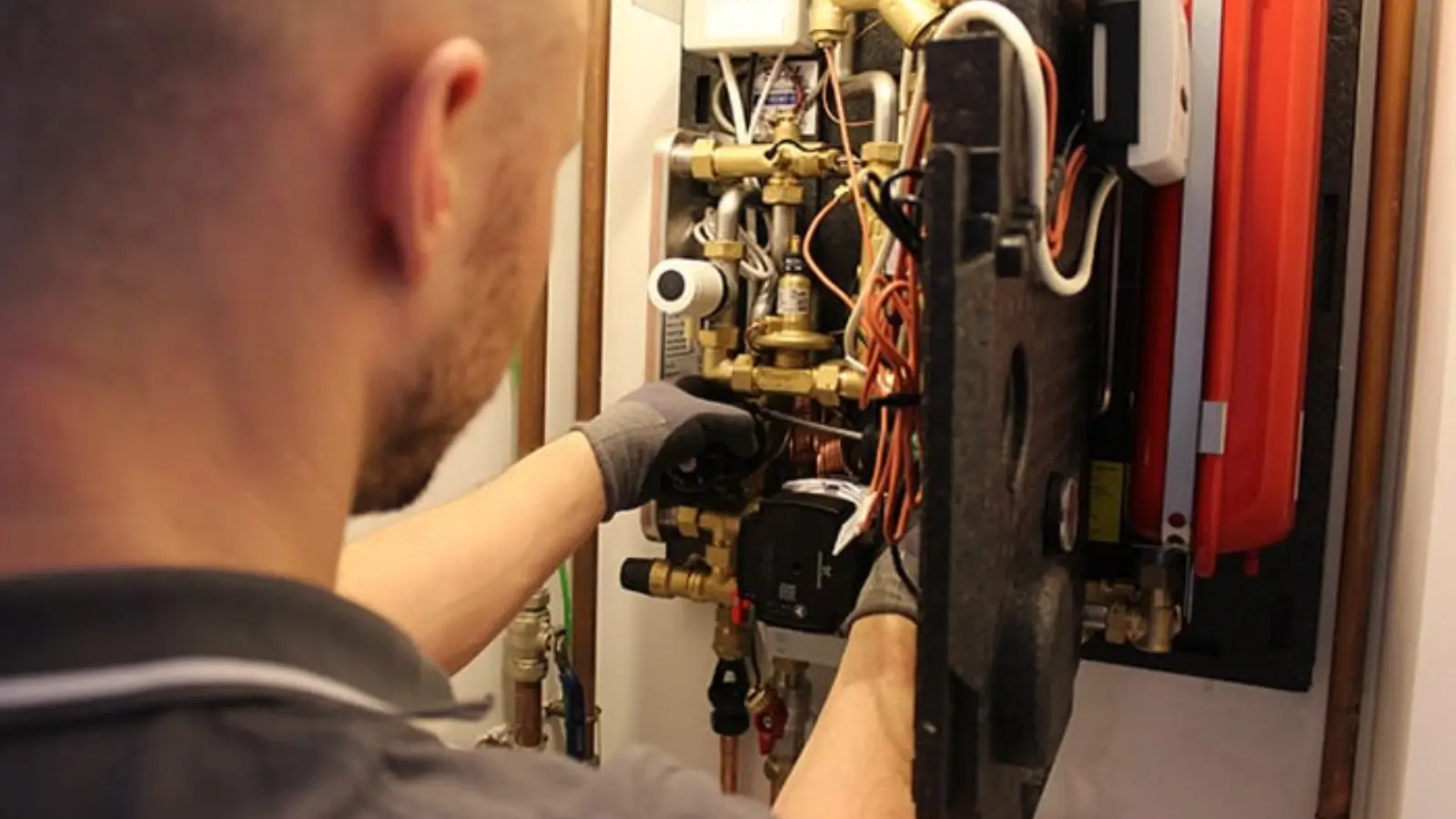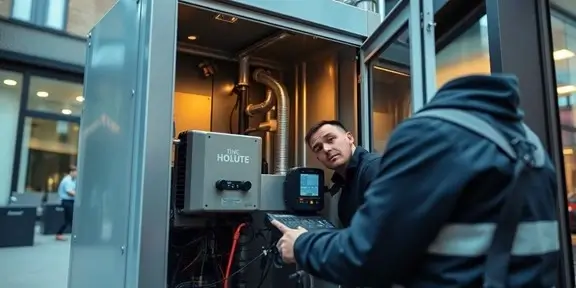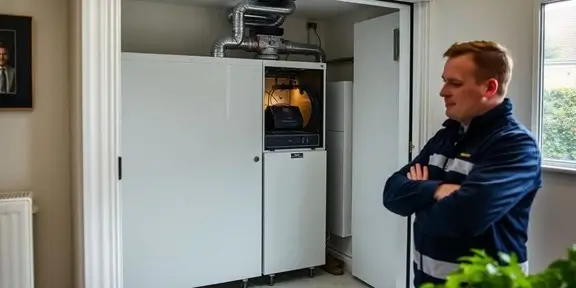


A Heat Interface Unit, or HIU, is a key piece of equipment in buildings that use communal heating. It acts like a small, efficient boiler for your individual flat, but instead of using gas, it takes hot water from a central plant and uses it to provide your heating and hot water.
Think of it as the bridge between the building's main heating system and your home's radiators and taps. It manages the heat transfer, making sure you get the right amount of warmth and hot water when you need it. This system helps keep energy use down by only heating what's needed for each unit.
Regular checks on your HIU are important. They help make sure the unit works well and lasts longer. Without proper care, an HIU might not heat your home as effectively, leading to discomfort and higher bills.
Finding out which HIU model you have is usually straightforward. Look for a manufacturer's sticker or plate on the unit itself. Sometimes, the color of the unit or the brand of the heat meter installed nearby can also give you clues.
If you're still unsure, check any manuals or documentation that came with your property. If you can't find this information, don't worry.
Contacting your building manager or the service provider can also help identify your specific HIU model. They often keep records of the installed equipment.
HIUs are central to how communal heating systems work. They take heat from a shared source, like a district heating network, and distribute it to individual homes. This setup means that while the building shares a primary heat source, each home can control its own heating and hot water.
This system allows for individual control over comfort levels and energy use. It separates the building's main system from your home's internal plumbing, which is good for safety and maintenance.
The HIU's job is to manage heat transfer efficiently, ensuring that each dwelling receives the heating and hot water it requires without affecting others. This makes communal heating a practical and often more eco-friendly option for apartment blocks.
Proper maintenance of the HIU is key to the whole system's performance. A well-maintained HIU means consistent heat for residents and fewer problems for the building management.
London winters can be harsh. A reliable heating system is not just a luxury; it's a necessity for tenant comfort. Regular HIU servicing keeps these systems running smoothly, providing consistent heat and hot water, even when the temperature drops.
A well-maintained HIU prevents the discomfort of cold homes and ensures tenants are happy. This proactive approach avoids the common issues that lead to heating failures, making sure your property remains a desirable place to live throughout the year.
Think of your HIU like any other complex machine; it needs regular tune-ups to perform at its best. Without consistent HIU servicing, components can wear down, leading to reduced efficiency and higher energy consumption.
This inefficiency translates directly into higher energy bills for both landlords and tenants. By keeping your HIU in good working order, you can significantly cut down on wasted energy and save money. It’s a simple way to make your property more economical.
Regular maintenance is key to maximizing the lifespan and efficiency of your HIU. Neglecting it is like ignoring a small leak in your roof – it will only get worse and more expensive to fix.
Nobody wants to deal with a heating breakdown, especially during the colder months. These emergencies are not only inconvenient for tenants but also incredibly expensive to fix, often requiring urgent call-outs.
Consistent HIU servicing helps catch small problems before they become major ones. By addressing issues early, you can prevent costly repairs and significantly extend the operational life of your equipment. This means fewer unexpected expenses and a more reliable heating system overall.
Here’s what regular servicing helps prevent:
When a qualified technician visits to service your Heat Interface Unit (HIU), they start with a thorough check of every part. This includes looking closely at the heat exchanger, pumps, valves, and the control panel. They're checking for any signs of wear, potential leaks, or build-up that could affect how well the HIU works or if it's safe to use. This detailed inspection is key to catching small problems before they become big ones.
They'll also look at things like water samples from the system and check the heat meter readings. This helps them understand the system's overall efficiency and if there are any issues with water quality. It’s all part of making sure your HIU is running as it should.
Over time, HIUs can get clogged with dirt, debris, and limescale, which really hurts their performance. During a service, the engineer will clean out filters and strainers to make sure water can flow freely. If any parts look worn out, like fiber washers, they might replace them to keep the unit in good shape.
Sometimes, simple cleaning tasks can make a big difference in how an HIU operates. Neglecting this basic maintenance can lead to lower energy efficiency and higher bills. A clean HIU is a happy HIU.
No one wants some homes to be too hot while others are too cold. That's where system balancing comes in. The engineer will adjust the HIU settings to make sure heat and hot water are spread out evenly to all connected units. This process ensures fair distribution and prevents any single unit from using too much energy.
This balancing act is important for both comfort and efficiency. It means everyone gets the heat they need without waste. A well-balanced system contributes to a more predictable and cost-effective communal heating setup.
When your heat interface unit (HIU) needs attention, picking the right service provider makes all the difference. It’s not just about finding someone who knows heating systems; you need a specialist. Think about it like needing a specific repair on a complex appliance – you wouldn't call just anyone, right? You'd look for someone who truly understands that particular make and model. This is especially true for HIUs, which are key components in communal heating systems.
A provider with genuine HIU expertise will have engineers trained specifically on these units. They understand the unique workings and potential issues that can arise. This specialized knowledge means they can diagnose problems faster and more accurately, saving you time and potential headaches. Relying on a general plumber might seem like an option, but it often leads to misdiagnosis or incomplete repairs, costing more in the long run.
Finding a reliable HIU service provider is about more than just fixing a problem; it's about ensuring consistent comfort and efficiency for your property. A good provider will have a clear process for servicing and maintenance, making the experience straightforward for you. They understand the importance of keeping these systems running smoothly.
Before you book a service, always check the credentials of the engineers. For any work involving gas or potentially gas-related components, Gas Safe registration is a legal requirement in the UK. This ensures the engineer has met the necessary safety standards to work on such systems.
Beyond Gas Safe, look for specific certifications or training related to HIU systems. Many HIU manufacturers offer specialized training programs for engineers. A provider that invests in this kind of training demonstrates a commitment to quality and safety. Don't hesitate to ask about their engineers' qualifications and experience with your specific type of HIU.
It’s also wise to inquire about their identification procedures. A professional HIU service company will have engineers who carry identification badges and often arrive in branded vehicles. This adds a layer of security and professionalism to the service visit.
Experience counts for a lot in this field. A company that has been servicing HIUs in London for several years likely has a solid understanding of common issues and effective solutions. They’ve probably seen it all and know how to handle various scenarios efficiently.
Customer reviews and testimonials can offer a realistic glimpse into a provider's performance. Look for feedback on their punctuality, the quality of their work, their communication, and how they handle any unexpected problems. Online reviews, Google testimonials, or even word-of-mouth recommendations can be very helpful.
When evaluating a provider, consider their track record. Do they have a history of prompt service? Are their pricing structures clear and transparent? A reputable HIU service provider will be upfront about costs and timelines, building trust with their clients. Checking these details beforehand can save a lot of trouble later on.

Sometimes, your Heat Interface Unit (HIU) will give you hints that it's not happy. You might notice your radiators aren't getting as warm as they used to, or perhaps the hot water takes ages to arrive. Another common sign is when the water temperature fluctuates wildly, going from nice and warm to surprisingly cold. These aren't just minor annoyances; they're signals that your HIU might need a check-up. Ignoring these can lead to bigger problems down the line.
Pay attention to any unusual sounds coming from the unit. Gurgling, banging, or whistling noises can indicate air trapped in the system or worn-out parts. You might also see a rise in your energy bills without a clear reason, suggesting the HIU is working harder than it should. If your HIU has error codes or warning lights, that's a definite sign something needs professional attention. Keeping an eye on these indicators helps you stay ahead of potential issues.
Regularly checking for these symptoms is key to proactive HIU maintenance. It’s like listening to your body; if something feels off, it’s worth investigating. A well-maintained HIU means consistent comfort and fewer unexpected headaches. Remember, a little attention now can save a lot of trouble later, especially when it comes to keeping your home warm and your water hot.
A faulty Heat Interface Unit (HIU) isn't just about comfort; it's a serious safety concern. Issues like gas leaks or carbon monoxide build-up can happen if the unit isn't working right. Regular servicing is key to making sure your HIU operates safely. This means checking for any potential hazards and fixing them before they become big problems.
Think of HIU maintenance as a safety net. It helps prevent dangerous situations, giving everyone peace of mind. A well-maintained unit reduces the risk of unexpected failures that could put people in harm's way. It’s about keeping your property and its occupants safe.
As a landlord or property manager, you have responsibilities to your tenants. This includes making sure their heating and hot water systems are safe and reliable. Regular HIU servicing helps you meet these obligations. It shows you're committed to providing a safe living environment.
By having your HIU checked annually by a qualified engineer, you're doing what's required by law. This proactive approach protects your tenants and also shields you from potential legal issues. It’s a smart way to manage your property and look after the people living in it.
Staying up-to-date with safety regulations is vital for any property owner. HIUs, like all gas and heating appliances, must be maintained correctly. Annual servicing by a Gas Safe registered engineer is often a requirement to stay compliant.
This regular maintenance not only keeps you on the right side of the law but also helps avoid fines or penalties. It’s about more than just avoiding trouble; it’s about upholding standards. Proper HIU maintenance is a clear sign of responsible property management.
Here are some common signs your HIU might need attention:
Neglecting your HIU can lead to more than just discomfort; it can create genuine safety hazards. Regular checks are not optional; they are a necessity for safe operation and legal compliance.

Sometimes, even with regular servicing, an HIU reaches a point where repairs just don't make sense anymore. If your unit is constantly breaking down, requiring frequent, expensive fixes, it might be time to think about a replacement. Older models can become obsolete, meaning parts are hard to find or incredibly costly. That’s when arranging an HIU replacement in London with a trusted provider like LHE can ensure you get a modern, efficient unit that saves you money and hassle in the long run.
Older models can become obsolete, meaning parts are hard to find or incredibly costly. A persistent pattern of issues signals that the unit's lifespan is likely nearing its end. It's like trying to keep an old car running with constant, costly repairs; eventually, a new vehicle is the more sensible option.
When an HIU is consistently failing, it's not just about the inconvenience. It can also mean reduced efficiency and higher energy bills, even when it is working. If you're noticing a significant drop in performance or a rise in energy consumption that can't be explained by other factors, your HIU might be the culprit. It's worth getting a professional opinion to see if the cost of ongoing repairs outweighs the investment in a new system.
Swapping out an old HIU for a newer model brings a host of advantages. Modern HIUs are designed with efficiency as a top priority. They often feature better insulation, more advanced controls, and improved heat exchangers, all contributing to lower energy usage. This means more consistent heating and hot water for your tenants, alongside noticeable savings on energy bills. Think of it as upgrading from an old, inefficient appliance to a new, energy-star rated one.
Beyond just saving money and improving comfort, newer HIU systems are generally more reliable and require less maintenance. They are built to meet current standards and often come with longer warranties, giving you peace of mind. Plus, many new units are designed to be more environmentally friendly, reducing your property's carbon footprint.
Replacing an HIU typically involves a qualified engineer who will first isolate the existing unit from the communal heating system. They'll then carefully remove the old HIU and install the new one, making all necessary pipework and electrical connections. After installation, a thorough system test is performed to check for leaks and ensure everything is functioning correctly.
This process usually takes a few hours, depending on the complexity of the installation and the specific model. It's important to schedule this work during a time that minimizes disruption for tenants, perhaps during warmer months if possible. A professional HIU replacement ensures the job is done safely and efficiently, getting your property back to full heating and hot water capacity with a reliable new unit.
Replacing an old HIU isn't just about fixing a problem; it's an investment in efficiency, reliability, and tenant satisfaction for years to come.
So, when it comes to keeping your tenants comfortable and your property running smoothly, looking after your Heat Interface Unit (HIU) is a big part of it. Regular check-ups aren't just about avoiding a cold snap disaster or a surprise repair bill, though those are definitely good reasons. It's about making sure the system works well, uses energy efficiently, and stays safe. Finding a service provider who knows their stuff, shows up on time, and communicates clearly makes all the difference. It’s a bit like getting your car serviced – you want someone who knows what they’re doing so you don’t end up with more problems than you started with. Investing in good HIU maintenance means fewer headaches for you and a warmer, happier home for your tenants.